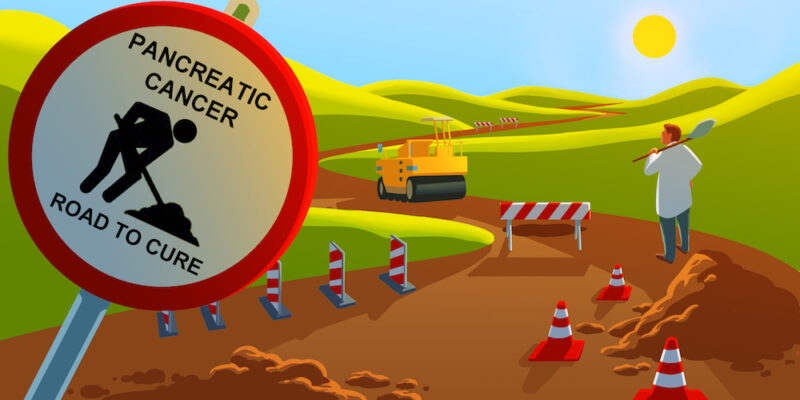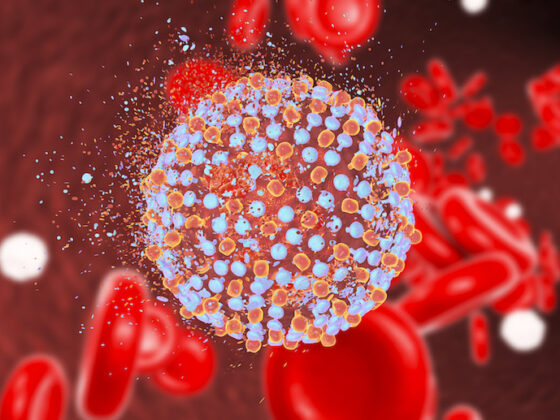Two recently published studies have provided insights into new ways of tackling pancreatic ductal adenocarcinomas (PDACs), a cancer where survival outcomes have made little progress in the past few decades.
Approximately 95% of pancreatic malignancies are pancreatic ductal adenocarcinomas (PDACs), which originate in cells lining the ducts transporting intestinal enzymes. With overall 5-year survival rates around 9%, PDACs represent one of the deadliest solid tumours. Poor survival is due to a combination of factors, including a lack of symptoms before the disease reaches an advanced stage, rapid disease progression and a lack of effective therapies. “Late diagnosis and relative rareness of pancreatic cancer means few patients can be recruited and retained on clinical trials, with the result that studies are difficult to deliver and struggle to achieve clear, significant findings,” says Chris MacDonald, Head of Research, at Pancreatic Cancer UK. Pancreatic tumours, he adds, have complex biology and are situated in inaccessible locations, making sample taking and/or visualisation difficult, further limiting treatment and research.
Conventional treatment approaches, which include surgery, radiation and chemotherapy, have had little impact on the course of disease, and in contrast to many other cancers, investigators have yet to succeed in identifying targets for personalised therapy. Additionally, immunotherapy clinical trials using the checkpoint inhibitors programmed cell death protein 1 (PD-1) and cytotoxic T lymphocyte-associated protein 4 (CTLA-4) as single agents have proved unsuccessful.
In the first study discussed here (Espinet E et al. Cancer Discov 2020), investigators from the German Cancer Research Centre and Heidelberg Institute for Stem Cell Technology and Experimental Medicine have succeeded in defining two molecularly different subtypes of PDAC by studying differences in gene methylation. “Based on the methylation patterns of the tumour genomes, we were able to define two completely different subtypes of adenocarcinomas, which differ in the course of carcinogenesis and in their aggressiveness” explains Elisa Espinet, the study’s first author.
Previous studies have attempted to work out genetic differences between PDACs, but results showed that different samples of PDACs all carried similar collections of mutations. In the current study, to avoid confounding influences of stromal cells in PDAC tumours, investigators, introduced a protocol to isolate epithelial cells from the complex cell mixture of connective tissue, vessels and immune cells. The team then searched the genomes of purified tumour cells for differences in the extent of gene methylation — molecular modifications that silence or inactivate gene expression.
The study revealed two distinct PDAC groups displaying high and low methylation patterns at regions encoding repeat elements. Tumours with low levels of methylation were characterised by higher expression of endogenous retroviral (ERV) transcripts, a process known as ‘viral mimicry’, which leads to formation of double-stranded RNA, and cell intrinsic activation of an interferon signature (IFNsign). “Our data show that differential DNA methylation…promotes a pro-inflammatory and tumour-promoting stromal feed-forward loop leading to increased aggressiveness of pancreatic cancer” write the authors.
Overall, the study revealed two distinct patterns of cells: those that were methylationlow/ IFNsignhigh and those that were methylationhigh/IFNsignlow. The authors propose that analysis of these traits could be used to improve risk stratification and provide novel targeting opportunities. The aggressive methylationlow/IFNsignhigh subtype could potentially be targeted by agents that block intrinsic IFN-signalling.
In the second study presented in this article (Steele NG et al. Nat Cancer 2020), researchers from the University of Michigan Rogel Cancer Center, looked to gain new perspectives in understanding individual differences in immune responses between patients with PDAC. To evaluate the complex biology of tumour samples, the team used multiple, complementary approaches. These included mass cytometry, single-cell RNA-seq and multiplex fluorescent immunochemistry, and they obtained samples from fine-needle biopsy and matched patient blood.
A key finding was the presence of an immune receptor called TIGIT (T-cell Immunoreceptor with Ig and ITIM domains) in the blood of a subset of PDAC patients. TIGIT is an inhibitory molecule associated with human cancers and T-cell exhaustion phenotypes. Inhibition of TIGIT has been demonstrated to enhance antitumor T-cell responses through its role as a ligand for the co-stimulatory receptor CD226.
The researchers believe that such findings point to patient-specific immune changes that should be taken into consideration, and that immunotherapy targets should be widened beyond the usual suspects of PD-1 and CTLA4. “What these research efforts have shown is that there is a lot more than just those two bad actors that are inhibiting the immune system and contributing to the ineffectiveness of immune therapy. TIGIT has been barely a blip on the radar,” said co-senior author Howard Crawford.
Commenting on the studies, MacDonald says “Both studies are comprehensive pieces of research that offer long-term potential to inform treatment decision making and personalise treatments to individuals based on their immune profiles and/or markers of gene modifications. For both, if you know how the patient’s immune system or tumour may respond to different treatments you can try to make sure treatments selected are as effective as possible for that individual.”
He further comments that the Cancer Discovery paper shows that not only changes in DNA but also changes in gene modifications (i.e. methylation) influence the aggressiveness of pancreatic tumours. The study in Nature Cancer demonstrates the huge complexity of the immune system in pancreatic cancer. He adds: “Even with the promise of immunotherapies being so close, as has been the case for other cancers, much work is still needed to understand immune response during pancreatic cancer initiation growth.”
To bring about any changes in treatment approaches, MacDonald cautions, a considerable amount of additional research will be needed. “These studies represent useful building blocks in foundation knowledge, that once we can begin to process and refine, will generate improvements to treatment and survival of people with pancreatic cancer”.












